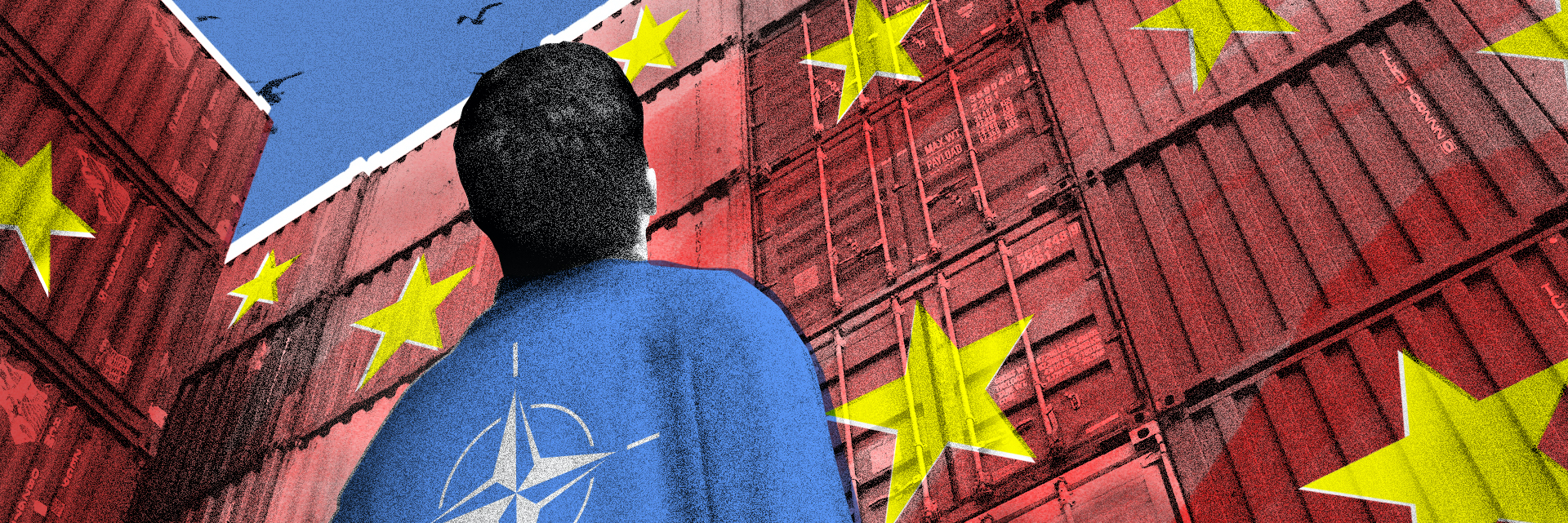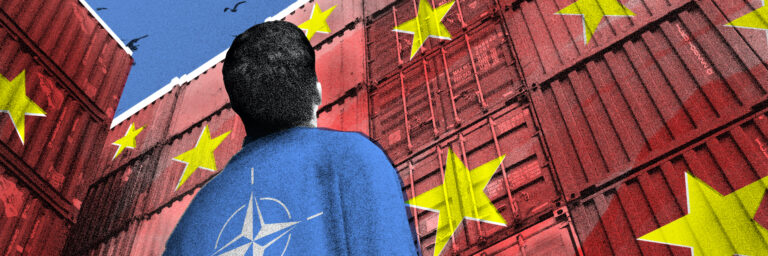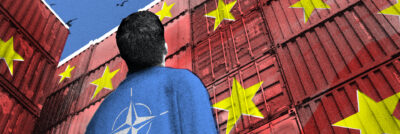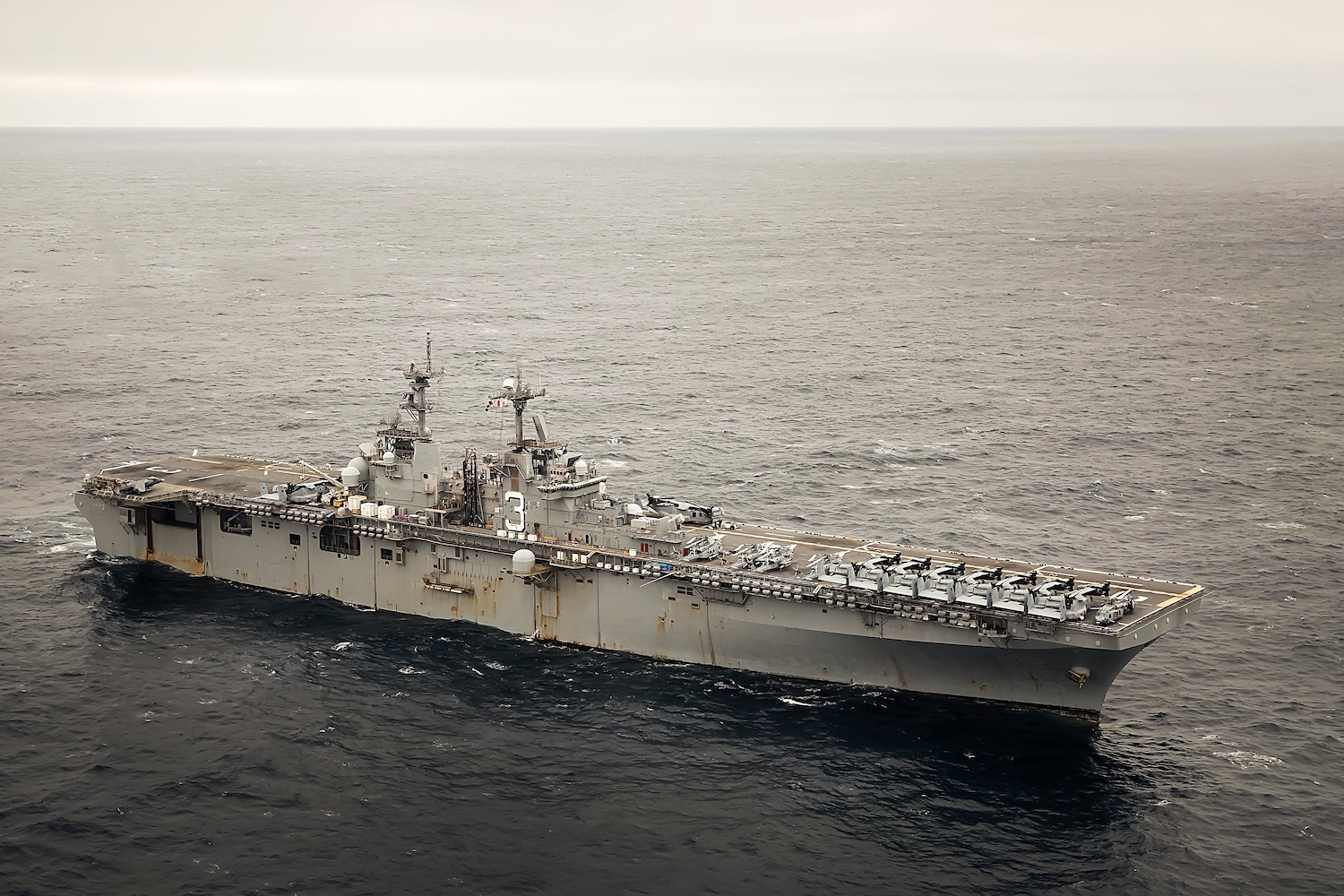by Laurens Groeneveld/Investigative Desk, Maria Pankowska/OKO.press
Port terminals in European cities such as Gdynia, Rotterdam and Antwerpen-Zeebrugge are crucial logistic hubs for the arrival of US Armed Forces and equipment for the protection of NATO’s flank in Eastern Europe. An investigation by The Investigative Desk (Amsterdam) in cooperation with OKO.press and FRONTSTORY.PL shows how large-scale investments by Chinese companies in these ports may compromise NATO’s response capabilities.
This article is also available in Polish on FRONTSTORY.PL and OKO.press
‘There is nothing accidental about a destroyer from the US Navy being in the port of Gdynia. I assure you of that.’ It was with those words in early June 2022 that US Ambassador to Poland Mark Brzezinski welcomed an American warship to the country for the third time in as many months. Especially after the Russian invasion of Ukraine, the United States is keen to show that Poland can count on its support. In the days that followed, as many as 1,500 military vehicles, including tanks and armoured cars, rolled across the quay here as part of the US military presence in the country. The Polish port plays a crucial role in defending NATO’s eastern flank against Russia.
Gdynia, along with Rotterdam and Antwerpen-Zeebrugge, is part of a network of European ports with which the US Armed Forces has a special agreement to serve as arrival points for military equipment and soldiers. As recently as in mid-September, the famous USS Kearsarge amphibious assault ship docked in Gdynia for maintenance and logistical purposes.
But just when the US military is looking to greatly expand its presence in Europe, the usability of these ports has come into question. Increased investment in these key ports by Chinese companies creates risks of espionage, increasing economic dependence and the presence of Chinese naval vessels, especially since China is maintaining increasingly close relations with Russia.
This has become evident from a new investigation by The Investigative Desk in cooperation with OKO.press and FRONTSTORY.PL.
A Chinese deep seaport in NATO’s backyard
With Finland and Sweden about to join NATO, the Baltic Sea has effectively become an internal NATO sea. Since the Russian invasion of Ukraine, the sea has been awash with Western naval vessels and military transports. The port of Gdynia plays a central role in this. Arms shipments for Ukraine arrive here and large quantities of Ukrainian grain were shipped from here in May due to the Russian blockade of the Black Sea.
This so-called ‘dual-use port’ shall soon play an even more important role in the Polish economy. In November 2020, Gdynia’s port authority announced plans for the construction of a new deep-sea terminal to the tune of approximately 1 billion euros (in current prices), the largest tender of its kind ever in Poland. Several companies linked to China are competing for its construction.
Among them, Hutchison Ports Poland, a subsidiary of the Hong Kong trading house CK Hutchison Holdings, and Mota-Engil Central Europe, a subsidiary of the Portuguese Mota-Engil Group, partially owned by the China Communications Construction Company.
Several senior former military officers warned against Chinese investments in port infrastructure. According to Jarosław Stróżyk, former Polish Defence attaché in Washington, any Chinese bridgehead serves industrial espionage and certain monopoly positions should be preserved for European countries only. Stróżyk also fears that Chinese investments could jeopardize the operational functions of the port.
A port is an excellent place to have your ‘eyes and ears’, said Steven Horrell, a former intelligence officer in the US Navy.
The fact that Hutchinson is competing to build the new Polish terminal fits the deepening of the Sino-Polish relationship. The Polish Economic Institute says that in 2020 Poland was the third largest recipient of Chinese investment in the European Union after Germany and France. Polish President Andrzej Duda was one of the few Western leaders attending the Beijing Olympics earlier this year. During a recent phone call with Duda, Chinese President Xi Jinping recently announced that Poland is for China a ‘priority partner’ for cooperation in Europe.
Economic environment turned hostile
NATO views these Chinese actions with growing concern. In March 2022, former NATO Supreme Allied Commander Europe Tod Wolters pointed out in the US Senate that awareness is growing among allies about the risks of Chinese investment in critical infrastructure.
Indeed, in 2021, the construction of a similar deep-sea terminal by the Chinese state-owned company China Merchants Ports at the Lithuanian port of Klaipeda was halted by the government because of the ‘risks to national security and to NATO’. In August, Germany’s Economy Minister Robert Habeck blocked the sale of a stake in a terminal at the Port of Hamburg to Chinese company COSCO out of fear of over-dependence on China. Hamburg is home to more than 500 Chinese companies and more than half of Sino-German trade passes through the port.
In Gdynia, Hutchinson already operates a small container terminal (20 ha) through a subsidiary company: Gdynia Container Terminal (GCT). The company has no plans to leave Gdynia any time soon: in 2005 it signed a perpetual lease contract with the port authority. The new contract expires in 2104. Other Chinese companies signed similar 99-year lease contracts in ports in Cambodia and Australia.
Recently, it seemed that China would expand its presence in the port. In autumn 2021, GCT took part in the tender for the lease of the neighbouring and larger Baltic Container Terminal. Hutchinson argued that a combination of BCT and GCT would create a natural counterbalance to the nearby container terminal in Gdańsk.
Its only competitor was BCT’s existing operator: International Container Terminal Services (ICTSI) from the Philippines. The tender was announced in August 2021. But even though Hutchinson’s (GCT) chances seemed good, the only company which submitted the final bid in June 2022 was ICTSI.
According to an anonymous source, who closely followed the tender, in late 2021 and early 2022 the investment climate turned against the Chinese. This was a result of Russia’s war against Ukraine and Polish media publications warning against allowing China to acquire more influence in the critical port infrastructure. ‘The Chinese bid was submitted literally minutes after the deadline,’ our source said.
Two minutes to be precise’ – specifies an employee at GCT with whom we managed to get in touch. He emphasizes that the company had its reasons. And suggests that we follow the final outcome of the tender, as the contract with ICTSI has not yet been signed. The employee adds that GCT observes all tender proceedings in Polish Ports.
The Polish Ministry of Infrastructure denied any sort of involvement in the matter and underlined that Gdynia’s Port Authority is a ‘commercial legal entity that acts on its own responsibility’. ‘The regulations in force do not give the State Treasury, represented by the minister of Infrastructure, the possibility to influence the outcome of the tender, let alone the decisions of foreign contractors,’ it replied.
Hutchinson is still competing for the construction of the deep-sea terminal. The procedure to choose the private partner of the project has been going on since February 2021. According to our anonymous source, the potential investors are not convinced that the Polish government really intends to invest in the new terminal in the near future. Former head of the Port Authority Janusz Jarosiński said that if the deep-sea terminal is to be operational, Gdynia needs to upgrade its road network to handle the higher truck traffic. Without new roads, all other preparations for the construction of the port seem pointless to Jarosiński.
The Port Authority is however adamant that the talks are progressing according to schedule and the new port shall open in 2028. If Hutchinson wins the bid, they will not only build it, but also get the right to lease it for the next 30 years.
Close ties between Chinese private companies and state
The first large-scale study of Chinese port ownership, recently published by researchers Isaac Kardon, affiliated with the US Naval War College and Wendy Leutert of the Indiana University Hamilton Lugar School of Global and International Studies, showed that the Chinese companies now own or operate one or more terminals in as many as 96 ports worldwide. That includes 22 ports in Europe, with prominent examples of Rotterdam, Antwerp-Zeebrugge and Valencia. A large number of terminals in those ports are fully or partially managed by three big Chinese companies: COSCO Shipping Ports, China Merchants Ports and Hutchison Port Holdings.
In their publication ‘Pier Competitor: China’s Power Position in Global Ports’, Kardon and Leutert claim that commercial cargo transport remains the primary function of Chinese firms’ port terminals at home and abroad. They argue however that China’s global port expansion already enables vital military functions.
A new 2017 ‘transportation law’ in China requires the Chinese companies and their overseas subsidiaries in the international transportation sector to provide supplies and support ships, aircraft, vehicles and personnel for Chinese military operations. The law allows the People’s Liberation Army (PLA) to access and use assets of Chinese firms under a foreign jurisdiction. The law also stipulates that, if necessary, the Chinese army, can place soldiers or officers among personnel of transportation companies, including Hutchison, COSCO and CMP.
Of the three largest Chinese port companies, only Hutchison Ports is not a state-owned enterprise. Although this officially places it further away from state influence, the researchers Kardon and Leutert have no doubt that China has means of influencing the company. Victor Li, the current chief executive of parent company CK Hutchison Holdings Limited, is a member of the Chinese People’s Political Consultative Conference, a key advisory board to the Chinese government. Li also supported the new controversial Hong Kong security law, which among others criminalizes any discussion about the possibility of secession of Hong Kong from China.
There is little difference between state-owned or private companies in China from a security perspective, Miles Yu, the chief China adviser to Mike Pompeo, the former US Secretary of State, told us: ‘China runs its economy like a giant corporation, with the Communist Party Central Committee at the top as the board and with Xi Jinping as the chairman and CEO.’
According to Yu, it is mandatory for every large company in China to allow a Communist Party cell to enter all operational levels of a company.
German MEP Reinhard Butikofer shares Yu’s view on this. ‘Big Chinese private companies are so really only by name, and the effective control of the Communist Party over companies is not limited to just state-owned companies,’ he said.
From publicly available information, it is not possible to determine whether cells of the Chinese Communist Party are present at Hutchison. According to Bart Kuipers, a researcher in port economics at Erasmus University in Rotterdam, the main question is how the situation will be in ten years’ time as China exerts more and more control over Hong Kong.
A representative of Gdynia Container Terminal refused to share with us any comments on the possible influence of the Chinese authorities over Hutchinson’s Polish branch.
Hutchison Port Holdings and the Chinese embassy in Poland did not reply to our request for comments, either.
Hutchinson’s links to the Chinese state may not be limited to the political power of China. In her recent book ‘The Chinese hold us tight’, Polish journalist Sylwia Czubkowska recalls a story from 1996, when the son of then-CEO of Hutchinson, Li Ka-shing, was kidnapped. The businessman paid the kidnapper an astonishing ransom of 1.038 m Hong Kong dollars but did not report the case to the Hong Kong police. Instead, it was prosecuted by the authorities in mainland China, who arrested the kidnapper and sentenced him to death in 1998. According to Czubkowska, Hutchinson to this day owes a debt of gratitude to the Chinese state. The kidnapped son was Victor Li, the current CEO of CK Hutchinson Holdings, whom we mentioned above.
China’s ‘Go-Out’ strategy
Buying up and investing in foreign companies and infrastructure such as ports is actively encouraged by the Chinese government. It began in 1999 with the announcement of the ‘Go-out’ (zouchuqu) policy by former President Jiang Zemin. The first major wave of port investments by China worldwide followed soon after in 2001. The second big wave came in 2013, coinciding with the announcement of China’s new Silk Road, in which ports such as Piraeus in Greece play a crucial role. Piraeus is considered the European port where Chinese companies exert the most influence, as they not only manage the terminals but also own the port authority. The third and fourth waves took place in 2017 and 2019 with more than 10 investments in a year.
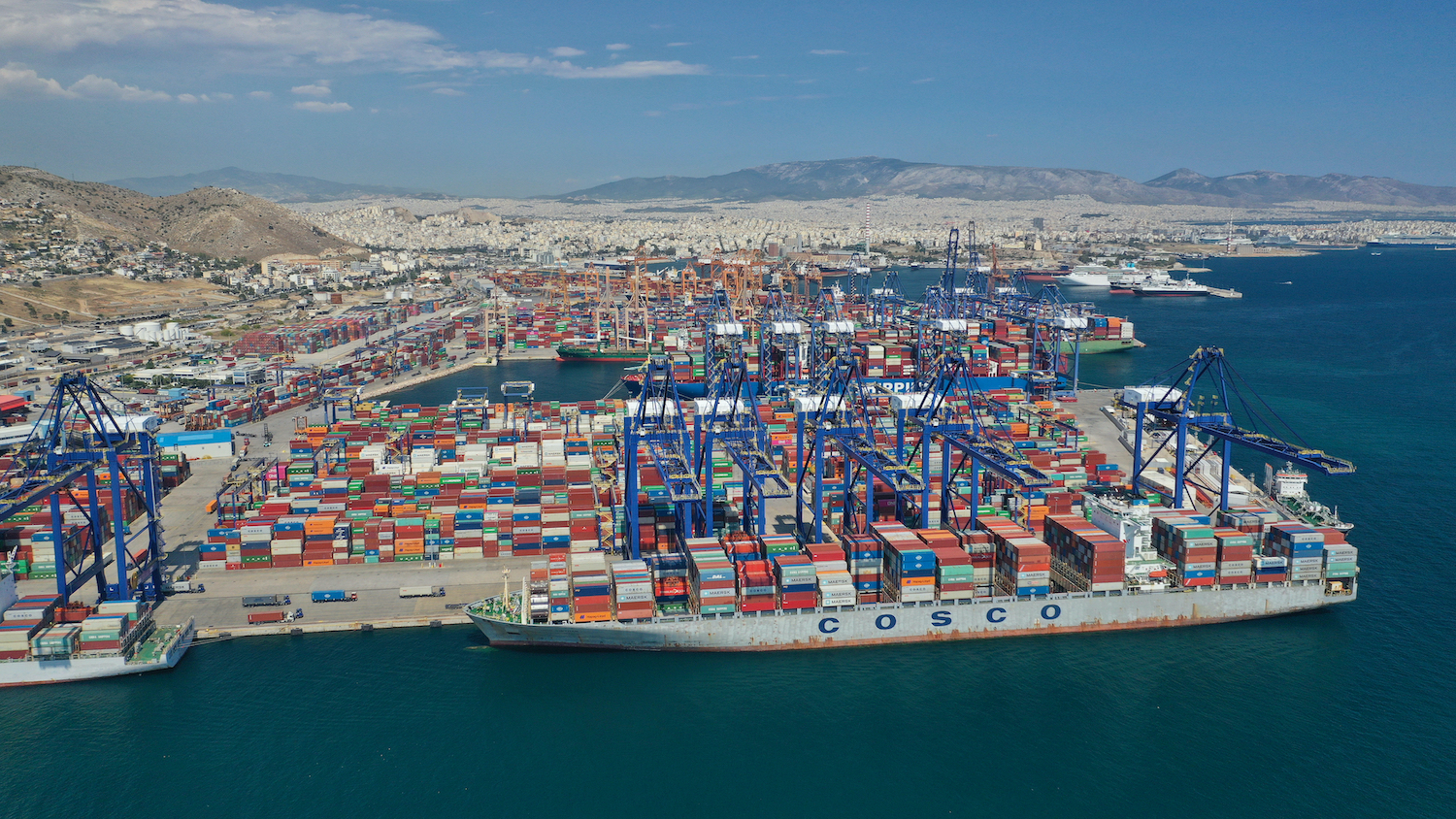
Aerial drone photo of industrial container logistics unloading import and export container terminal of Perama – Piraeus, 2021. Source: Aerial-motion / Shutterstock
In their study, researchers Kardon and Leutert state that ‘the PLA (China’s People’s Liberation Army) almost certainly collects intelligence and conducts surveillance from overseas commercial ports’.
They also argue that for Chinese President Xi Jinping further ‘military-civilian fusion’ is a priority, something he has regularly referred to in speeches. The Central Commission for Integrated Military and Civilian Development within the Communist Party, established in 2017, is another example of this.
The first effects of this policy are already visible. Since 2017, in at least nine ports where Chinese companies operate, Chinese navy warships have undergone significant repairs, maintenance or have docked for a technical stop.
All of these ports were along a sea route economically crucial to China: via the Indian Ocean to the Mediterranean Sea. They included Alexandria in Egypt, Valencia in Spain and Piraeus in Greece.
A significant portion of port investment by the Chinese companies takes place along this route. Currently China has only one foreign military base, in Djibouti. According to Kardon and Leutert, it is unlikely it will be able to establish other bases soon due to strong international pushbacks, which could be damaging for its Belt and Road Initiative.
Meanwhile, commercial ports are an attractive alternative, they argue: ‘Chinese companies’ large holdings of commercial assets abroad in critical infrastructure, especially ports, can support logistics, intelligence and other military missions cheaply and without the geopolitical consequences that dedicated overseas bases would trigger.’
Broken chain
In recent years, NATO has been warning about the risks of Chinese investments in increasingly robust language. In the new strategic concept presented last June, member states wrote that the PRC (People’s Republic of China) ‘seeks to control critical infrastructure’ and that ‘it uses its economic leverage to create strategic dependencies and enhance its influence’.
Rotterdam, like Gdynia, is seen as a crucial port for NATO, but has a much larger presence of Chinese companies. At least 50% of container transhipment here is currently in their hands as two out of four terminals are fully managed by Chinese companies.
In a response to our questions, the AIVD, the Dutch intelligence service, acknowledged that it monitors the risks of economic threats from state actors in relation to the function of the Netherlands’ largest port.
To understand the threat, the AIVD focuses, among other things, on possible risks of sabotage of shipping handling and the loss of strategic independence in this process. The Polish military counter-intelligence service refused to share with us any sort of information concerning its potential activities in the port of Gdynia.
A large Chinese presence in the port, as in the case of Rotterdam, is a security risk according to Steven Horrell. In addition to the threat of espionage, he sees the possibility of bureaucracy being used as a weapon: ‘All it takes is a little disruption. Logistics is a chain. If you disrupt one link, you disrupt the whole chain.’
According to Horrell, who has been stationed at the US Navy base in Naples, Italy, and at the British Air Force base in Molesworth, UK, there are no concerns about a direct war between NATO and China, but rather about China’s possible support for Russia. ‘If you are talking about the Chinese government of the CCP (Chinese Communist Party) wanting to support its allies or occasional partner in Moscow. Then yes, there is a lever of influence that could happen through Hutchison.’
Horrell pointed out that ports such as Rotterdam, Antwerp-Zeebrugge and Gdynia are crucial for the defence of Europe: ‘It’s all about the flow of equipment, material and military personnel from North America into Europe, then you have to look at the port where you’re doing that. If all those ports become partly Chinese owned, they may be vulnerable.’
According to German MEP Reinhard Butikofer, authorities do not realize enough that ‘dependence can be used as a weapon’. The problem, he said, is that cities are afraid of losing Chinese trade to other ports in the region. ‘Some authorities assume that allowing Chinese investment would guarantee to bind those investors to a specific port. That could turn out to be a bitter illusion.’
In a reply to our questions, the Port of Rotterdam stated that terminal operators in Rotterdam rent their sites from the port authority and operate autonomously from the Chinese government.
It also said that ‘the only shareholders are the city of Rotterdam and the Dutch state’. Therefore, according to the Port of Rotterdam, there is no ‘China-managed port’: ‘The Chinese military cannot impose anything on the Port of Rotterdam. In addition, there is no dependence on China in any way as may be the case in other countries.’
American counteroffensive
The sensitivity of this issue in Washington was demonstrated just last August when US Deputy Secretary of State Wendy Sherman travelled to the Solomon Islands to improve diplomatic relations. The archipelago signed a security pact with China in March 2022 that gives the Chinese navy access to the port in the country’s capital, Honiara.
Following Sherman’s visit, British and American naval vessels were for the first time ever denied access to the port of Honiara at the end of August 2022.
The Biden administration also intervened in a secret construction project at Khalifa Port in the United Arab Emirates in late 2021. A military facility was secretly being built in a terminal operated by COSCO, according to US intelligence officials. Camouflaged Chinese Navy ships used for collecting intelligence were also spotted in the port. Construction was stopped by the Emirates after heavy diplomatic pressure from Washington.
These diplomatic interventions also show President Joe Biden is continuing his predecessor’s policy on this issue.
It was under the Trump administration that the United States fought hard to prevent the bankrupt port of Subic Bay, in the Philippines, from falling into Chinese hands. Until 1992, the strategically located port on the southern edge of the South China Sea housed the largest US Naval base outside the United States. The port ended up in the hands of American Cerberus Capital Management in 2022. According to Miles Yu, the US, Japan and South Korea intervened together. ‘The Chinese were eventually kicked out of that buying process,’ Yu said.
It is unclear if – just like in other countries – the US intervened in the recent tender for a container terminal in Gdynia. The US ambassador to Poland refused to comment on the tender.
While the Chinese are reluctant to comment on US interventions, they officially interpret them as part of the trade war between the two countries. In this vein, although not explicitly, President Xi Jinping addressed the 2021 World Economic Forum in Davos. He called for the rejection of the ‘Cold War mentality’.
‘We must advocate fair competition, like competing with each other for excellence in a racing field, not beating each other in a wrestling arena,’ Xi said.
European response
According to Tom Berendsen, rapporteur on industrial policy in the European Parliament, EU Member States are often too naive when it comes to China.
Following the reporting by The Investigative Desk, OKO.press, and FRONTSTORY.PL, Berendsen wants answers from the European Commission. ‘I want to know how the Commission assesses this situation from a strategic point of view, security and economic dependence.’
The MEP wants to know from the European Commission how it will now ‘really work on monitoring Chinese influence in European strategic sectors’. In recent years, Berendsen asked five times whether the European Commission has figures on Chinese interference in European critical infrastructure and strategic sectors. According to him, that overview is still not there.
Berendsen wants the European Commission, together with the Member States, to look at all positions of Chinese companies in strategic places.
The Investigative Desk is a group of specialised investigative journalists. It funds its work with donations, subsidies, grants and publication fees. Its donors have no role or substantive say in its investigations and publications. More details on www.investigativedesk.com
OKO.press is an independent civic medium fighting disinformation and propaganda through investigative journalism, fact-checking and debunking. Established in 2016 to preserve freedom of speech and secure access to information in Poland, it is funded with readers’ donations (80% of income) and grants.
FRONTSTORY.PL is an online Polish medium established in 2021 by VSquare’s publisher Fundacja Reporterów (FR), the first Polish non-profit journalistic organization entirely focused on independent, cross-border, investigative journalism in Central Europe. FR’s team of experienced investigative journalists conducts data-driven, complex investigations.
Polish investigative outlet created by Reporters' Foundation.

